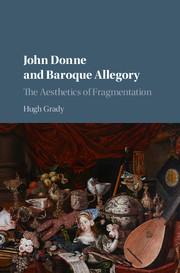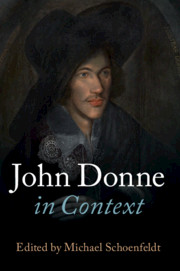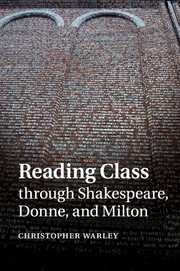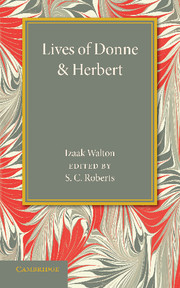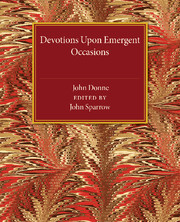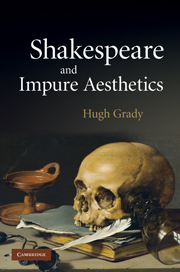John Donne and Baroque Allegory
The Aesthetics of Fragmentation
£91.99
- Author: Hugh Grady, Arcadia University, Pennsylvania
- Date Published: August 2017
- availability: Available
- format: Hardback
- isbn: 9781107195806
£
91.99
Hardback
Other available formats:
eBook
Looking for an inspection copy?
This title is not currently available on inspection
-
John Donne has been one of the most controversial poets in the history of English literature, his complexity and intellectualism provoking both praise and censure. In this major re-assessment of Donne's poetry, Hugh Grady argues that his work can be newly appreciated in our own era through Walter Benjamin's theory of baroque allegory. Providing close readings of The Anniversaries, The Songs and Sonnets, and selected other lyrics, this study reveals Donne as being immersed in the aesthetic of fragmentation that define both the baroque and the postmodernist aesthetics of today. Synthesizing cultural criticism and formalist analysis, Grady illuminates Donne afresh as a great poet for our own historical moment.
Read more- Evaluates John Donne's poetry through the lens of Walter Benjamin's theory of baroque allegory and in doing so reveals a fresh appreciation of some of the most studied documents of English literature
- Includes close readings of The Anniversaries, The Songs and Sonnets, and selected other lyrical works
- Develops new directions in the study of John Donne's writing
Reviews & endorsements
'Grady carefully rehearses the critical transition from the modernist to the postmodernist Donne, which he describes as essentially the transition from aesthetic unity to fragmentation. He also reviews all or most previous attempts to situate Donne's poetics in the perspective of baroque art, which leads to a fairly exhaustive review of major critics from T. S. Eliot, I. A. Richards, and Cleanth Brooks through Anthony Mazzeo, Mario Praz, and Louis Martz.' Catherine Gimelli Martin, Modern Philology
See more reviews'[John Donne and Baroque Allegory] offers a number of new perspectives, introducing, for example, a series of early modern and more contemporary European voices to Donne studies … As such, this is a book which will no doubt play an important role in inspiring future creative interventions in Donne studies.' Emma Rhatigan, Modern Language Review
Customer reviews
Not yet reviewed
Be the first to review
Review was not posted due to profanity
×Product details
- Date Published: August 2017
- format: Hardback
- isbn: 9781107195806
- length: 236 pages
- dimensions: 235 x 158 x 17 mm
- weight: 0.48kg
- contains: 1 b/w illus.
- availability: Available
Table of Contents
1. Walter Benjamin and John Donne: constellations of past and present
2. The Anniversaries as baroque allegory: mourning, idealization, and the resistance to unity
3. Donne's The Songs and Sonnets: living in a fragmented world
4. Allegorical objects and metaphysical conceits: thinking about Donne's tropes with Benjamin
5. The metaphysics of correspondence or a fragmented world? Baroque poetics in the seventeenth century
6. Conclusion.
Sorry, this resource is locked
Please register or sign in to request access. If you are having problems accessing these resources please email [email protected]
Register Sign in» Proceed
You are now leaving the Cambridge University Press website. Your eBook purchase and download will be completed by our partner www.ebooks.com. Please see the permission section of the www.ebooks.com catalogue page for details of the print & copy limits on our eBooks.
Continue ×Are you sure you want to delete your account?
This cannot be undone.
Thank you for your feedback which will help us improve our service.
If you requested a response, we will make sure to get back to you shortly.
×
